(完整word版)仁爱版英语八年级下册教材同步详解
仁爱英语八年级下册u7t1知识点

仁爱英语八年级下册u7t1知识点在英语学习的过程中,学生们经常会遇到一些难点,需要认真学习并掌握。
本文将为大家介绍八年级下册Unit 7 Topic 1的知识点,希望能帮助大家更好地学习英语。
一、新单词1. profession 职业2. occupation 职业3. accountant 会计4. architect 建筑师5. doctor 医生6. engineer 工程师7. lawyer 律师8. musician 音乐家9. nurse 护士10. painter 画家11. scientist 科学家12. student 学生13. teacher 教师二、职业对话的表达在职场交流中,了解相关的表达是非常重要的。
以下是一些常见的职业对话表达。
1. What do you do? 你是做什么的?2. I’m an architect. 我是一名建筑师。
3. What’s your occupation? 你的职业是什么?4. I work as a nurse. 我从事护理工作。
5. What kind of work do you do? 你从事什么样的工作?6. I’m a teacher. 我是一名教师。
7. What’s your profession? 你的专业是什么?8. I’m a scientist. 我是一名科学家。
三、数字和金额表达在财务方面,数字的表达方式需要非常准确。
以下是一些常见的数字和金额表达方式的对话。
1. How much is it? 它多少钱?2. It’s twenty dollars. 它是二十美元。
3. How many students are there in your class? 你们班有多少学生?4. There are thirty students in my class. 我们班有三十个学生。
5. How much do you make? 你挣多少钱?6. I make sixty thousand dollars a year. 我一年挣六万美元。
仁爱版英语八年级下册u5t3A知识点梳理
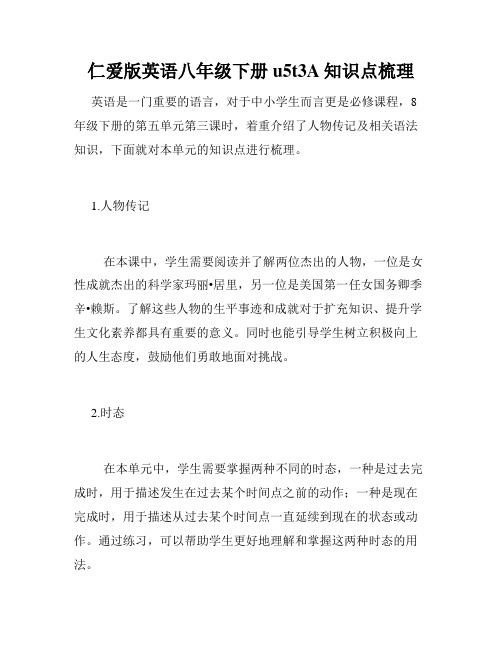
仁爱版英语八年级下册u5t3A知识点梳理英语是一门重要的语言,对于中小学生而言更是必修课程,8年级下册的第五单元第三课时,着重介绍了人物传记及相关语法知识,下面就对本单元的知识点进行梳理。
1.人物传记
在本课中,学生需要阅读并了解两位杰出的人物,一位是女性成就杰出的科学家玛丽•居里,另一位是美国第一任女国务卿季辛•赖斯。
了解这些人物的生平事迹和成就对于扩充知识、提升学生文化素养都具有重要的意义。
同时也能引导学生树立积极向上的人生态度,鼓励他们勇敢地面对挑战。
2.时态
在本单元中,学生需要掌握两种不同的时态,一种是过去完成时,用于描述发生在过去某个时间点之前的动作;一种是现在完成时,用于描述从过去某个时间点一直延续到现在的状态或动作。
通过练习,可以帮助学生更好地理解和掌握这两种时态的用法。
3.被动语态
本单元还涉及到被动语态的用法,被动语态是英语中常用的一种语态,用于表达主语是被动的动作或状态。
被动语态的构成方法和注意事项是学生需要重点掌握的内容。
同时,学生还需要通过各种语境锻炼对被动语态的理解和应用能力。
4.介绍他人
本单元也包括介绍他人的语言表达方式,学生需要掌握如何描述他人的职业、特点、成就等信息,此处也讲解了形容词和副词的用法,是对中学生英语实际应用方面的极好的培训。
总之,在学习本单元的相关知识点时,学生需要通过多种方式进行学习和实践,例如阅读、听力、口语表达、写作等。
只有通过种种方式的有机结合,才能够更好地掌握英语知识和提高英语水平。
仁爱版八年级英语下册课件-Unit-8-Topic-2-Section-B

3. The daughter will take her shoes off when entering a Japanese home. T
4. Kangkang hurts his knees because he does too much sports.
he doesn’t wear his sports clothes
2 It’s necessary/important that they/the students listen to the teacher carefully in class. It’s necessary/important (for them/the students) to
listen to the teacher listen to the teacher carefully in class.
Presentation
2 Make sentences with the following information, using It's + adj.+ (for sb.) to do sth. or It's +adj.+that...
necessary suitable important right Example:
2 Make sentences with the following information, using It's + adj.+ (for sb.) to do sth. or It's +adj.+that...
It’s suitable that we wear business suits in a
(word完整版)仁爱版初中英语语法大全,推荐文档
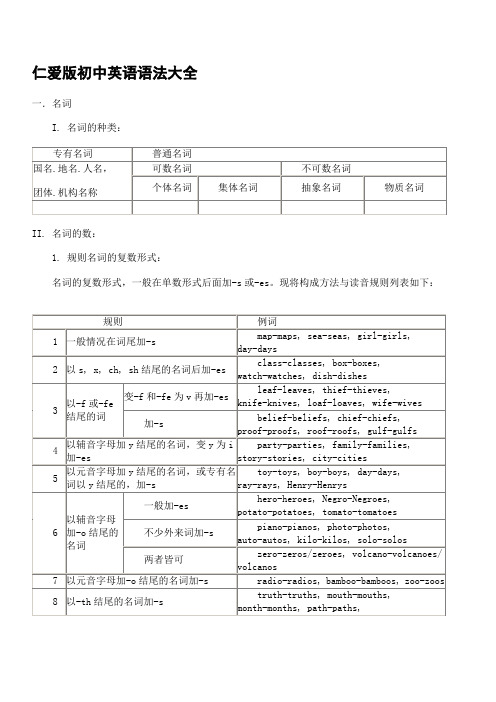
1. one, some与any:1) one可以泛指任何人,也可特指,复数为ones。
some多用于肯定句,any多用于疑问句和否定句。
One should learn to think of others.Have you any bookmarks? No, I don’t have any bookmarks.I have some questions to ask.2) some可用于疑问句中,表示盼望得到肯定的答复,或者表示建议,请求等。
Would you like some bananas? Could you give me some money?3) some 和any修饰可数名词单数时,some表示某个,any表示任何一个。
I have read this article in some magazine. Please correct the mistakes, if any.4) some和数词连用表示“大约”,any可与比较级连用表示程度。
There are some 3,000 students in this school. Do you feel any better today?2. each和every:each强调个别,代表的数可以是两个或两个以上,而every强调整体,所指的数必须是三个或三个以上。
Each student has a pocket dictionary. / Each (of us) has a dictionary. / We each have a dictionary.Every student has strong and weak points. / Every one of us has strong and weak points.3. none和no:no等于not any,作定语。
none作主语或宾语,代替不可数名词,谓语用单数,代替可数名词,谓语单复数皆可以。
(完整word版)仁爱版八年级英语下册短语英汉互译汇总

八年级仁爱英语下册短语总结Unit 5 Topic 11. invite sb. to do sth. 邀请某人做某事2. go to the movies 去看电影3. prepare sth. for sb. 为某人准备某物4. say thanks to 向。
道谢5. a ticket to ``````票/入场卷6. be able to= can 能够···7. care for 照顾,照看= take care of=look after8. because of 因为,由于(与because的区别)9. cheer up 使振作起来,使高兴起来10. in the end 最后,终于11. come into being 形成12. be full of 充满,装满13. become interested in 对```感兴趣14. make peace with sb. 与某人和解15. be popular with 受···欢迎Unit 5 Topic 21. seem to do sth. 似乎2. be strict with sb. 对某人要求严格3. have a talk with sb. 与某人谈话4. be worried about 担心。
5. take it easy 别紧张,别着急6. fail the exam 考试不及格7. at one’s age 在某人的年龄8. tell jokes 讲笑话9. have problem with sth. 做某事困难10. as usual 像往常一样,照例11. be / get used to (doing) sth.习惯于(做)某事12. as…as 像```````一样13. deal with 处理,解决14. even though 即使,尽管15. no longer 不再Unit 5 Topic 31. have a test=have an exam考试2. follow one’s advice 遵循某人的建议3. get nervous 变得紧张4. fall off 摔落5. give a speech 做演讲6. be confident about 对···有信心7. in a bad mood 心情好/ 糟糕8. put on 表演9. be proud of 为···自豪/骄傲10. give sb a surprise 给某人惊喜11. become sick 生病12. Let’s get ready for it. 让我们做好准备13. have trouble (in) doing sth.做。
仁爱版英语八年级下册Unit6 Topic3 教材知识详解
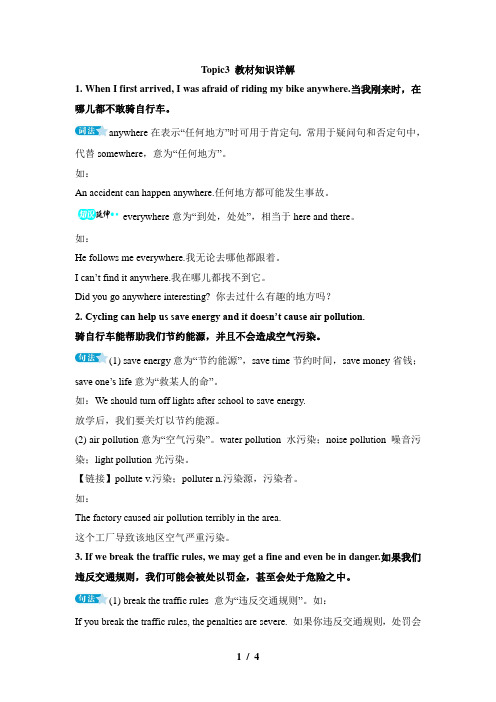
Topic3 教材知识详解1. When I first arrived, I was afraid of riding my bike anywhere.当我刚来时,在哪儿都不敢骑自行车。
anywhere在表示“任何地方”时可用于肯定句。
常用于疑问句和否定句中,代替somewhere,意为“任何地方”。
如:An accident can happen anywhere.任何地方都可能发生事故。
everywhere意为“到处,处处”,相当于here and there。
如:He follows me everywhere.我无论去哪他都跟着。
I can’t find it anywhere.我在哪儿都找不到它。
Did you go anywhere interesting? 你去过什么有趣的地方吗?2.Cycling can help us save energy and it doesn’t cause air pollution.骑自行车能帮助我们节约能源,并且不会造成空气污染。
(1) save energy意为“节约能源”,save time节约时间,save money省钱;save one’s life意为“救某人的命”。
如:We should turn off lights after school to save energy.放学后,我们要关灯以节约能源。
(2) air pollution意为“空气污染”。
water pollution 水污染;noise pollution 噪音污染;light pollution光污染。
【链接】pollute v.污染;polluter n.污染源,污染者。
如:The factory caused air pollution terribly in the area.这个工厂导致该地区空气严重污染。
3. If we break the traffic rules, we may get a fine and even be in danger.如果我们违反交通规则,我们可能会被处以罚金,甚至会处于危险之中。
Unit 5 Topic 1 Section B-八年级英语下册(仁爱版)

While-listening
4a Read the following words, paying attention to the sounds of the underlined letters. Try to find the rules and add more words.
asked stopped washed
While-liste4nbingRead the sentences in the box and pay attention to the stress, liaison and
intonation. Choose the correct ones to complete the conversation. Then practice it with your partner.
a. ˈHow are you ˈdoing?
b. ˈWhat a ˈpity!
c. I don’t like it at all.
d. ˈGuess ˈwhat!
e. We ˈfelt exˈcited to ˈhear it.
f. ˈHow did the ˈmusic ˈsound?
A: Hi, Kangkang. _____a______
loved
learned called
excited interested disappointed
While-listeRneinagd aloud the words and group them according to the pronunciation of the underlined letters of the words.
英
语
Warming up—Pre-listening—While-listening—Post-listening—Exercises —Summary
仁爱八年级下册知识点

仁爱八年级下册知识点
自2019年开始,仁爱八年级下册教材面世,闪亮登场。
这个
教材有哪些重要的知识点呢?本文将围绕着这个问题展开。
首先,这个教材有着跨学科的教学特点。
自然灾害、科技发展、历史文化等多个方面都被涉及到。
这不仅有利于学生掌握跨学科
知识,还能让他们学会全面思考问题。
其次,文化篇章是这个教材的重点。
特别是针对中国文化的介绍,内容十分详尽。
从茶道、书法、绘画、音乐等各个角度来了
解中国文化的底蕴,让学生们掌握文明的根基。
再次,这个教材强调了语言能力的提高。
每个单元的末尾都会
有一些课文,并附带练习,让学生们能够锻炼自己的语言表达能力。
通过阅读、倾听、写作等多种方式,提升学生的语言修养和
语感。
此外,这个教材也强调了思维能力的培养。
每个单元都会有一
些思维导图和讨论题,让学生们能够更好地理解知识点。
这些导
图和讨论题是开放性的,让学生们自己探究、思考,从而培养了
他们的观察能力和独立思考的能力。
最后,这个教材还附带了一些学术性的知识点。
比如,有关地
壳构造、气候变化、公民权利等等,让学生们大开眼界,了解到
更广阔的世界。
总之,仁爱八年级下册教材不仅有教学内容,而且还有跨学科、文化篇章、语言能力、思维能力、以及学术性知识点等多个教学
特点。
这些特点不仅有助于学生们在学习上的提升,还能够为他
们未来的发展奠定坚实的基础。
仁爱版八年级英语下册课件 Unit 6 Topic 3 Section C

Warming up
Task 1 Speak out as many traffic rules as you can.
Task 2 Talk about the results of breaking the traffic rules using “if” clause.
bicycles. So bicycle riders must pa注y 意attepnatyioanttetonttihoen ttroadffoicinagrostuhn.d them and know
交通信号
遵守安全规则
traffic signals. They must know and obey the safety rules. They must wear helmets
__w__il_l_b_e__ (be) safer. 4. He _w_i_ll_m__is_s_ (miss) the train if he gets up late.
“主将从现”原则
Review
Review
Complete the sentences.
1. If you__r_id_e__ (ride) at night, you must be careful. 2. If he _d_r_i_v_es__ (drive) too fast, he may have an accident. 3. 3. If you _d_r_i_v_e__(drive) a car in England, you must drive
Unit 6 Enjoying Cycling Topic 3
Bicycle riding is good exercise.
(word完整版)仁爱版八年级上册英语知识点归纳,文档

八年级英语〔仁爱版〕上册语言点归纳Unit 1 Sports and GamesTopic 1 Are you going to play basketball ?一.要点词语 :1. almost(反义词 )never2.win(过去式 )won( 名词 )winner3.ski( 现在分词 )skiing4.famous(比较级 )more famous5.arrive(同义词 )reach6.leave(过去式 ))left7.popular(最高等 )most popular 8.healthy(同义词 )fit(名词 )health(一) 词组1.during the summer holidays在暑期期间2. betweenand在两者之间3.cheer sb. on为某人加油4.prefer doing sth.更喜欢做某事5.quite a bit/a lot好多6.plan to do sth.方案做某事7.have a skating club举办滑雪俱乐部8.go skating/skiing/bicycling/climbing/hiking去滑雪/ 溜冰/ 骑车/ 爬山/远足9.arrive in/at到达10.play against与抗衡 / 较量11.for long许久12.leave for出发去13.the day after tomorrow后天14.China’s national team中国国家队15.play baseball打棒球16.at least最少17.What a shame!多愧疚!18.be good at擅长做某事19.take part in参加20.all over the world全世界21.be good for对有益22. a good way一种好方法23.keep fit/healthy保持健康24.relax oneself放松某人自己二.要点句型1. What ’s your favorite sport? = What sport do you like best?你最喜爱的运动是什么 ?2.Which sport do you prefer? = Which sport do you like better?你更喜欢什么运动 ?I prefer skating. = I like skating better.我更喜欢滑雪 .3.Do you skate much? = Do you often skate?你常滑雪吗 ?4.She spends at least half an hour in the gym every day.每天她最少花半小时在体育馆 .5.She plays baseball pretty well and she is also good at jumping.她棒球打得相当好而且擅长于跳 .6.What kind of sports do you like? = Which sport do you like?你喜欢哪一种运动 ?7.Would you like to come and cheer us on ?你愿意来为我们加油吗?8.What are you going to be when you grow up?当你长大后做什么?9.There is going to be a school sports meet next month.下月有一场运动会。
(完整word版)仁爱版英语八年级下册整册教案
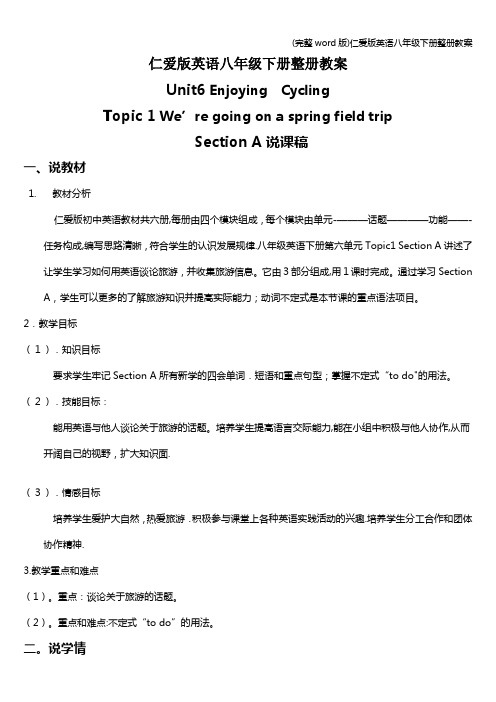
仁爱版英语八年级下册整册教案Unit6 Enjoying CyclingTopic 1 We’re going on a spring field tripSection A说课稿一、说教材1. 教材分析仁爱版初中英语教材共六册,每册由四个模块组成,每个模块由单元-———话题————功能——-任务构成,编写思路清晰,符合学生的认识发展规律.八年级英语下册第六单元Topic1 Section A讲述了让学生学习如何用英语谈论旅游,并收集旅游信息。
它由3部分组成,用1课时完成。
通过学习Section A,学生可以更多的了解旅游知识并提高实际能力;动词不定式是本节课的重点语法项目。
2.教学目标(1).知识目标要求学生牢记Section A所有新学的四会单词.短语和重点句型;掌握不定式“to do"的用法。
(2).技能目标:能用英语与他人谈论关于旅游的话题。
培养学生提高语言交际能力,能在小组中积极与他人协作,从而开阔自己的视野,扩大知识面.(3).情感目标培养学生爱护大自然,热爱旅游.积极参与课堂上各种英语实践活动的兴趣.培养学生分工合作和团体协作精神.3.教学重点和难点(1)。
重点:谈论关于旅游的话题。
(2)。
重点和难点:不定式“to do”的用法。
二。
说学情1.学生对旅游较感兴趣,但对旅游知识了解较少.2。
学生的词汇量掌握不多.3. 学生平时较少用英语与他人交谈并表达信息..三。
说教法学法按照课程改革的要求,遵循“老师由主演变导演,学生由配角变主角”的角色转换,采用把课堂交给学生的教学理论,我运用自由讨论。
分组工作.结对练习。
问答练习等方法,借助多媒体、录音机,图片等教学手段,设置特定的语言环境,使学生在轻松愉快的气氛中理解.运用英语。
四.说教学程序我设计了以下的步骤来训练学生的听.说。
读。
写的能力,尤其是他们“说”的能力。
(一)温故知新(1).请两位学生用上节课重点句型号,分别复述Unit 5 Topic3 Section D 1a(2).教师与学生之间进行问答对话,让学生谈论关于他们最喜爱的旅游方式.设计意图:巩固上节课学过的知识,为学习新课铺垫.(二)情景导入用多媒体展示一些关于旅游和交通的图片,来引起学生的兴趣,并由此教学本节课的新单词,如:field ,trip ,cycle ,vehicle ,airline等。
(完整word版)仁爱英语八年级下册单词表

Unit 5 Feeling Excited[Topic1] I’m so happy.invite v。
邀请,招待---——————-——--——1disappointed adj. 失望的,沮丧的——-—--——-——-—1film n. 电影;影片--————————-—-——-————2smell v. 发气;闻到n. 气味-—-—-—-——-————-——2seem v.似乎,好像-—--——---—--———-—-—----3opera n。
歌剧;歌剧剧本—————-—------———3Care for 照顾,照料---——-—------—5lonely adj。
孤独的,寂寞的;-—--—--—-----5lively adj. 充满趣味的;充满生气的----—--——-5cheer up 使振作起来;使高兴起来-—-—-—-—-—5almost adv。
几乎,差不多—-———-—-——-—--—5mainly adv。
主要的—-——-—————————-—--—-----————6role n. 角色---——-———-——-—-———-—--—-—-——-—--———-—7facial adj. 面部的———--—-—---—-----——--—-——————-7painting n. 油画,绘画——-—--——-——----—--——---7gesture n。
姿势,手势————--——-—--------————-7frightened adj. 惊吓的;受惊的;害怕的7worried adj. 担心的,担扰的-—------—————--—7in the end 最后,终于--—------—--—-————----—--7interested adj。
感兴趣的—-—-——-----———-—---—--7upset adj。
心烦的,苦恼的——-—-—----—-————---8[Topic2] I’m feeling better now.exam n. 考试-—------—-——————-———-—-——-9strict adj. 严格的;严密的--—--—-----—---———9be strict with 对……严格要求——---—-—-—-——-9shy adj. 害羞的————--———--———--——--——----—-—---9take it easy 别紧张,别着急---—---—---—-—-—10fail v. 不及格;失败;未做—-———-—--———-—11someone pron。
仁爱英语八年级下册u8知识点
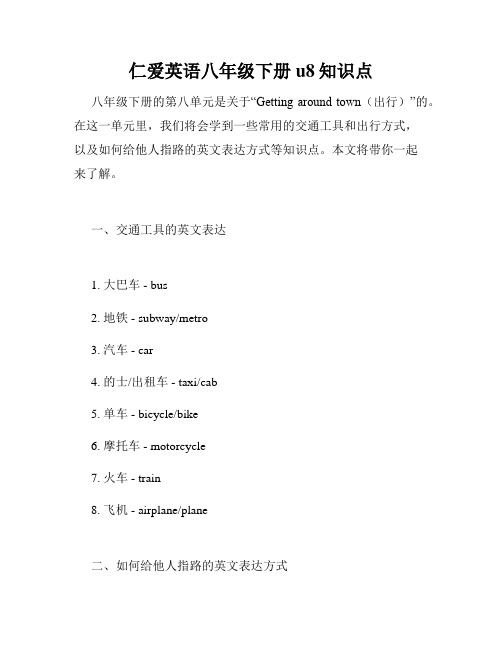
仁爱英语八年级下册u8知识点八年级下册的第八单元是关于“Getting around town(出行)”的。
在这一单元里,我们将会学到一些常用的交通工具和出行方式,以及如何给他人指路的英文表达方式等知识点。
本文将带你一起来了解。
一、交通工具的英文表达1. 大巴车 - bus2. 地铁 - subway/metro3. 汽车 - car4. 的士/出租车 - taxi/cab5. 单车 - bicycle/bike6. 摩托车 - motorcycle7. 火车 - train8. 飞机 - airplane/plane二、如何给他人指路的英文表达方式1. Excuse me, can you tell me how to get to…?(对不起,你能告诉我怎么到……吗?)2. How can I get to…from here?(我从这里怎么去……?)3. It’s on your left/right.(在你的左/右边。
)4. Go straight and turn left/right at the corner.(一直往前走,在拐角处向左/右拐。
)5. I t’s about…miles/kilometers from here.(离这里大概有……英里/千米。
)6. Take the bus/subway/train to…(坐公交车/地铁/火车去……)7. Walk straight for about 10 minutes.(往前走大约10分钟。
)8. You can’t miss it.(你不会错过它的。
)三、其他出行方式的英文表达1. 步行 - by foot/on foot2. 骑车 - by bicycle/by bike3. 搭车 - by car/take a ride4. 骑摩托车 - by motorcycle5. 坐船 - by boat本文简要介绍了仁爱英语八年级下册U8单元的知识点,包括常用交通工具的英文表达、给他人指路的英文表达方式和其他出行方式的英文表达。
2023年仁爱版八年级英语下册Unit 6 Enjoy cycling Topic 3 Bicycl
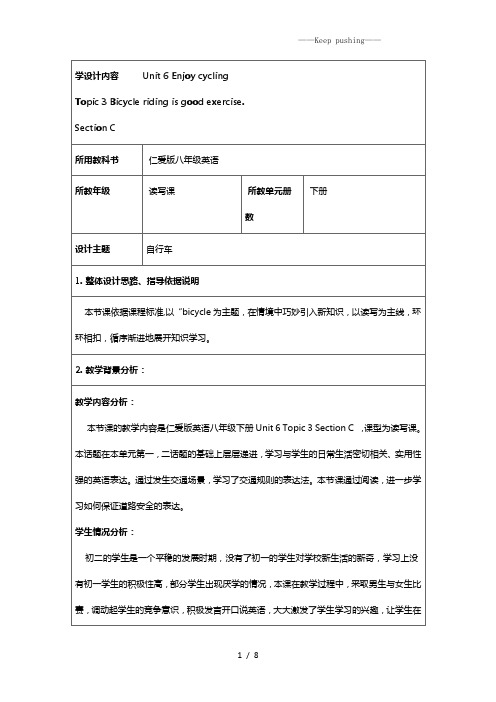
板书设计:Unit 6 Enjoy Cycling
Topic 3 Bicycle riding is good exercise. Section C
safety rules
pay attention to
in case of
in a word
You should …
You shouldn’t …
教学难点。
本节课还有一些需要改进之处:
1、时间分配需要更合理。
由于引入和练习环节稍超出预设范围,为使教学时间不超时,在后面讨论环节,未能让更多学生畅谈,深感遗憾。
2、在教学过程中,语度有些快,影响学生的理解,所以我在今后的教学中,应注意这些细节的处理。
教师的职务是‘千教万教,教人求真’;学生的职务是‘千学万学,学做真人’。
我们发现了儿童有创造力,认识了儿童有创造力,就须进一步把儿童的创造力解放出来。
——好词好句。
八年级英语仁爱版下知识点
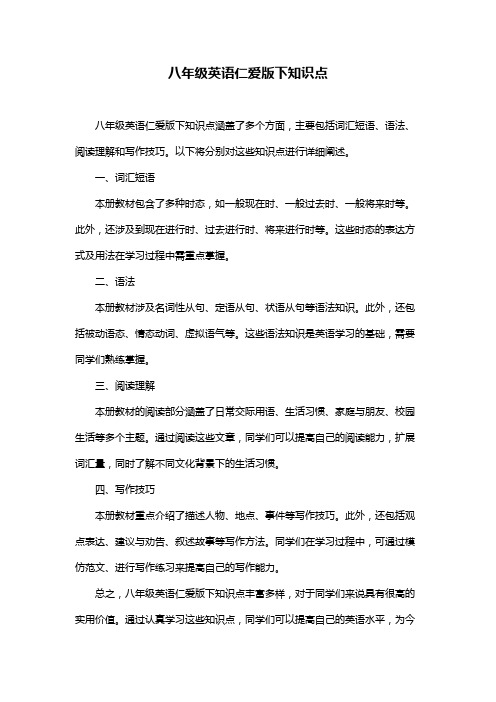
八年级英语仁爱版下知识点
八年级英语仁爱版下知识点涵盖了多个方面,主要包括词汇短语、语法、阅读理解和写作技巧。
以下将分别对这些知识点进行详细阐述。
一、词汇短语
本册教材包含了多种时态,如一般现在时、一般过去时、一般将来时等。
此外,还涉及到现在进行时、过去进行时、将来进行时等。
这些时态的表达方式及用法在学习过程中需重点掌握。
二、语法
本册教材涉及名词性从句、定语从句、状语从句等语法知识。
此外,还包括被动语态、情态动词、虚拟语气等。
这些语法知识是英语学习的基础,需要同学们熟练掌握。
三、阅读理解
本册教材的阅读部分涵盖了日常交际用语、生活习惯、家庭与朋友、校园生活等多个主题。
通过阅读这些文章,同学们可以提高自己的阅读能力,扩展词汇量,同时了解不同文化背景下的生活习惯。
四、写作技巧
本册教材重点介绍了描述人物、地点、事件等写作技巧。
此外,还包括观点表达、建议与劝告、叙述故事等写作方法。
同学们在学习过程中,可通过模仿范文、进行写作练习来提高自己的写作能力。
总之,八年级英语仁爱版下知识点丰富多样,对于同学们来说具有很高的实用价值。
通过认真学习这些知识点,同学们可以提高自己的英语水平,为今
后的学习打下坚实基础。
在学习过程中,要注重理论与实践相结合,及时巩固所学知识,不断提高自己的听、说、读、写能力。
北京仁爱版初中英语八年级下册 Unit 6 Topic 1 课文翻译

北京仁爱版初中英语八年级下册:Unit 6 Topic 1SectionA-1aMiss Wang:Boys and girls, I have some excitingnews to tell you! For our spring field trip, We're going on a three-day visit to Mount Tai.王老师:同学们,我有一些好消息要告诉你们!我们春游要去泰山旅游三天。
Maria:Wow, how wonderful! How shall we get there?马丽亚:哇哦,太棒了!我们要怎么去呢?Michael:Shall we cycle there?迈克尔:我们能骑自行车去吗?Kangkang:Sounds exciting! But it will take us a few days to get there by bike.康康:听起来很棒!但是骑自行车要花几天才能到。
Miss Wang:Let's make the decision together. It's too far to cycle, but we can choose proper vehicle.王老师:我们一起来做决定。
骑自行车太远了,不过我们可以选择合适的交通工具。
Jane:Yes. Let's decide.简:是的。
我们来决定吧。
Michael:Let's find out some information about the cost.迈克尔:我们先来看看费用的事。
Miss Wang:OK. Kangkang and Michael, you two find the cost for the train. Helen, you need to find the cost for the bus.王老师:好的。
康康,迈克尔,你们两个询问火车票价。
仁爱版八年级英语下册第五单元Topic1课件

4. 那些食物闻起来很香。 The food smells good.
(smell)
Summary
We learn:
♥ New words: invite, smell, film, disappointed ♥ Linking verbs: be, look, feel, smell, taste, sound ♥ Adjectives about feelings: happy, angry, excited,
• How are you feeling today? • I’m feeling… • Why?
初中英语仁爱版八年级 Unit5 Feeling Excited
Topic1 You look excited.
Section B
学习目标
一、掌握以下单词和短语:seem, opera 二、熟练掌握以下句型: 1. He seems a little unhappy. 2. I think it’s very interesting. 三、正确运用以-ed结尾的形容词和以-ing结尾的形容词。 四、能够运用系表结构的句子来谈论情绪。
1d Read 1a and complete the passage.
Kangkang looks _e_x_ci_t_ed_ because his parents want to _i_n_v_i_te_ Jane’s parents to go to see the movie, The Sound of Music, this S_a_t_u_r_d_ay_. The children plan to _s_p_e_n_d_ the evening at his house. His parents will prepare some d_e_l_ic_io_u_s_ food for them. Jane is very __h_a_p_p_y__ about the news. Kangkang saw Mr. Brown on his way. Mr. Brown was disappointed because he couldn’t buy a __ti_c_k_e_t _ to the film.
仁爱版八年级下册英语unit6-8知识点
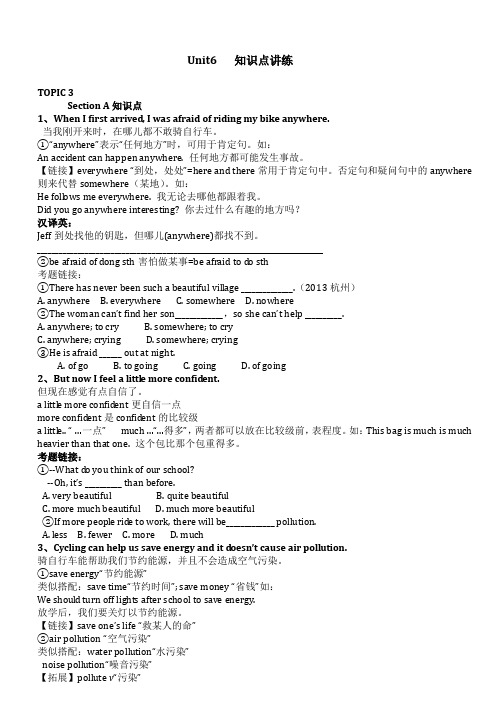
Unit6 知识点讲练TOPIC 3Section A知识点1、When I first arrived, I was afraid of riding my bike anywhere.当我刚开来时,在哪儿都不敢骑自行车。
①“anywhere”表示“任何地方”时,可用于肯定句。
如:An accid ent can happen anywhere. 任何地方都可能发生事故。
【链接】everywhere “到处,处处”=he re and there常用于肯定句中。
否定句和疑问句中的anywhere 则来代替somewhere(某地)。
如:He foll ows me everywhere. 我无论去哪他都跟着我。
Did you go anywhere interesting? 你去过什么有趣的地方吗?汉译英:Jeff到处找他的钥匙,但哪儿(anywhere)都找不到。
______________________________________②be afraid of d ong sth害怕做某事=be afraid to d o sth考题链接:①There has never been such a beautiful village ______________.(2013杭州)A. anywhereB. everywhereC. somewhereD. nowhere②The woman can’t find her son_____________,so she can’t help __________.A. anywhere; to cryB. somewhere; to cryC. anywhere; cryingD. somewhere; crying③He is afraid ______ out at night.A. of goB. to goingC. goingD. of going2、But now I feel a little more confident.但现在感觉有点自信了。
(完整word版)仁爱初中英语教材分析
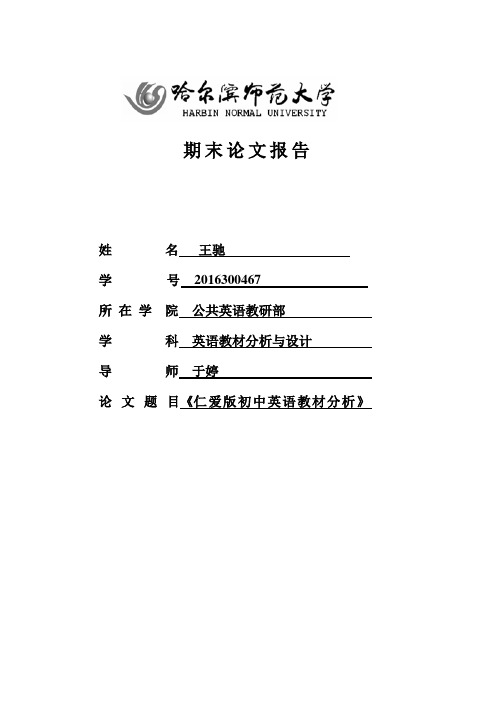
期末论文报告姓名王驰学号2016300467所在学院公共英语教研部学科英语教材分析与设计导师于婷论文题目《仁爱版初中英语教材分析》仁爱版初中英语教材分析摘要教材对于英语教学来说是有着重要作用的,它既是英语课程的重要组成部分,又是英语课程得以顺利实施的保证,笔者以仁爱版初中英语七年级上册为例来评析这本教材。
仁爱版初中英语教材由北京教育出版社出版,教材由Jim Greenlaw(加拿大)、王德春主编。
全书分六册,供初一到初三年级学生使用。
本文将通过内部评价来分析评价教材,旨在发现其优缺点,促进其完善,更好地实现其功能。
教材评价可以分为随意的印象性评价和有系统的评价。
有系统的评价可以从两个出发点进行:即以评价教材内在科学性、合理性和有效性为主的内部评价,以评价教材对于某一使用对象群体的适用性为主的外部评价。
本文将从内部评价对仁爱版初中英语教材进行分析。
关键词:教材;分析;中学教材的内部评价一般包括以下几个方面:(1)评价教材的教学指导思想;(2)评价教材采用的教学方法;(3)评价教材内容的选择和安排;(4)评价教材中语言素材的真实性和地道性;(5)评价教材的组成部分;(6)评价教材的设计。
下面将从六个方面对该教材进行评价。
(一)教材的教学指导思想任何教材的编写都是以某种教学思想为指导的。
教材内容的呈现在很大程度上取决于对语言本质的理解,教材的教学指导思想包括编者对语言的认识、对语言学习的认识以及对语言教学的认识,即语言观,语言学习观和语言教学观。
1、语言观所谓语言观,是指对语言本质所持的看法。
用用通俗的话来说,就是回答“语言是什么”这个最基本的问题。
有些教材侧重语言的构成,有些教材侧重语言的功能。
该套教材对于语言的功能、意念及情景等给予了相当程度的重视,尤其侧重交际与表达,让学生在如何使用语言方面得到了很多指导,体现了先进的语言观。
其次,教材中安排了大量听与说的活动,培养他们的交际能力。
这些都是值得肯定的,但同时我们也应该注意到,语言同时也作为一种符号系统,通过将语言以符号系统的形式呈现出来,会有利于学生掌握语言的形式和规律,从而加以灵活运用。
- 1、下载文档前请自行甄别文档内容的完整性,平台不提供额外的编辑、内容补充、找答案等附加服务。
- 2、"仅部分预览"的文档,不可在线预览部分如存在完整性等问题,可反馈申请退款(可完整预览的文档不适用该条件!)。
- 3、如文档侵犯您的权益,请联系客服反馈,我们会尽快为您处理(人工客服工作时间:9:00-18:30)。
八年级下册Unit 5 Topic 1Section A1. How are you doing ? = How are you ?2. My father and mother want to invite your parents to go to the movies.invite sb. to do sth. 邀请某人去做某事3. My mom will prepare delicious food for us.(1) prepare sth. for sb. 为某人准备某物:He prepared some presents for you.(2) prepare for ( doing ) sth. 为(做)某事而准备:Iam preparing for my exam.4. I went to buy tickets, but there was none left.none表示(三个或三个以上中)没有一个可与of 连用,None 可以回答How many引导的问句; no one = nobody(没有一个人)常只指人,不能与of 连用,常用来回答Who引导的问句。
5. lonely 孤独的;alone 单独的;单独地。
如:He lives alone, and he sometimes feels lonely. Section B1. He feels disappointed because he can’t get a ticket to The Sound of Music.to 可表“对应”,如:(1) the answer to the question问题的答案(2)the key to the lock 锁的钥匙(3)the ticket to the concert 演唱会的票2. be proud of = take pride in 以…而骄傲I am proud of my country.3. seem(看起来,似乎)的用法:(1)seem + 形容词:They seem worried.(2) seem to do sth. 如:He seems to know the truth.(3) seem + that从句,如:It seems that he knows the truth.4. be pleased/ satisfied with 对…感到满意Iam pleased with your results.5. Kangkang, are you setting the table for your friends ?set the table 摆放餐桌6. Michael isn’t able to come.be able to 常可和can 退换使用,都可以表“能”。
7. I hope everything goes well. 我希望一切进展顺利。
8. 给某人打电话的常用表达方法有:①ring/ call/ phone sb;②ring/ call sb up;③give sb. a ring/call;Section C1. Maria taught the children to sing lively songs to cheer themselves up.(1) cheer up 使…振奋/高兴起来:Our teachers cheer us up in class every day.(2) cheer on 为…加油,欢呼:Would you like to come and cheer us on.2. What…for ? 和Why相近,前者侧重提问目的,后者侧重提问原因。
回答前者常用含for 短语表目的;而回答后者须用because 表原因。
如:(1) What did he come here for ?---- He came here for his bike.(2) Why did he come here ?----- Because he want to see you.3. When and where will the movie be on ?be on 在经行,在放映:The movie is on.4. Jack and Rose fell into the sea with many other people .fall into 掉进,落入(into有“进入”的意思,如:jump into 跳入)Section D1. It came into being after 1790.come into being 诞生,形成:The CPC Party came into being in 1921.2. It’s full of famous stories.be full of = be filled with 装满,充满3. This kind of opera is very popular with Chinese people.be popular with 受…的欢迎:Yao Ming is popular with Chinese people.4. 语法:系动词+形容词(作表语)联系动词有五类:(1)表示“是”的be (am, is, are , was, were, been)(2) 表示保持一种状态的:keep, stay.(3) 表示“变”的:become, get, turn, go, grow.(4) 表示“看起来”的:look, seem, appear.(5) 表示与其它感官有关的:smell(闻起来),taste(尝起来),sound (听起来),feel (摸起来)八年级下册Unit 5 Topic 2Section A1. She is very strict with herself.(1) be strict with sb. 对某人要求严格:Our teacher is strict with us.(2) be strict in sth. 对某事要求严格:My teacher is strict in his work.2. I think I should have a talk with her.have a talk with sb. = talk with sb. 和某人交谈3. Take it easy. 别着急,别紧张。
Section B1. I’m feeling very sad because I failed the English exam.(1) fail the exam = don’t pass the exam 考试不及格(2) fail to do sth.做某事失败:Ifailed to pass the exam.2. Everyone gets these feelings at your age.(1) at one’s age 在某人的这个年龄阶段:Your father began to work at your age.(2) at the age of 在…岁时:At the age of seven, he could swim.3. 使令动词(make, let, have)的用法:make/ let / have sb do sth. 使某人做某事但have sth done 让某人干某事(自己不做),比较:①I have my son go instead (我让我儿子代去)②I had the machine repaired (让人修好了机器)get也可表“使,让”,但它后常接动词不定式:He got me to wash the car.4. 短语:in one’s teens 在某人十几岁时;in one’s twenties 在某人二十几岁时,in one’s thirties 在某人三十几岁时,in one’s forties在某人四十几岁时Section C1. How time flies! 光阴似箭2. What’s more 此外,而且:What’s more, it seems that my classmates don’t accept me.3. The girl is afraid of speaking in public.be afraid of (doing) sth.害怕(做)某事: I am afraid of dogs.Section D1. He refused to play soccer or go to the movies with his friends.refuse to do sth. 拒绝去做某事(refuse的反义词为accept)2. (1) instead 表“代替”,副词,后不接词,常放在句末或句首,如:If you are busy, you can come another day instead.(2) instead of 表“代替”,介词短语,后接词(被代替的内容),常放句中(谓语动词后),但不能做谓语,如:We eat rice instead of beef.(3) take the place of 表“代替”,动词短语,常放句中作谓语动词。
如:He took the place of me to finish the work.3. be angry with sb. 生某人的气;be angry at sth. 因某事而生气。
八年级下册Unit 5 Topic 3Section A1. Michael, I am sorry about your illness, but it can’t be SARS.must be 一定是;may be/ can be 可能是;can’t be 不可能是2. Follow the doctor’s advice, and you will get well soon.(1) follow one’s advice 遵循某人的建议(2) get well 恢复健康3. I missed a lot of lessons.miss lessons 意为“缺课”,miss 的意思有:(1)错过,如: I missed the early bus.(2)想念: I miss you very much.4. I’m worried about the test at the end of the month.(1) at the end of 在…的最后:You will find the post office at the end of the road.(2) by the end of 不迟于:I will finish my work by the end of this month.5. We can take turns to help you with your lessons.take turns to do sth.轮流去做某事:We take turns to clean the classroom.6. You can study by yourself. 你可以自学study/ learn (sth) by oneself = teach oneself (sth.) 自学…如:I learn English by myself. = I teach myself English.Section B1. If we are usually in a good mood, we may become healthier.be in a good / bad mood 处于好/坏心情;be in good health 很健康2. When someone is ill, he or she should try to smile at life.smile at life 笑对人生3. We can put on a short play.put on (1) 穿上:put on your shoes. (2) 上演:Put on a play.4. on the way home, you meet a big dog.On the/ one’s way (to)+ 地点:(在去某地的路上)当地点是副词(如home),不用to.5. Your mother get along well with her workmates.get along (well) with 与…相处好:I get along with my classmates.Section C1. 易混淆的几个词:sometimes 有时;sometime将来的某个时候;some times 几次;some time 一些时间2. When it rains, I often have unhappy thoughts.thought (1)名词,想法;主意。
